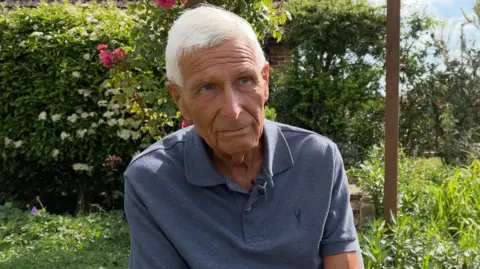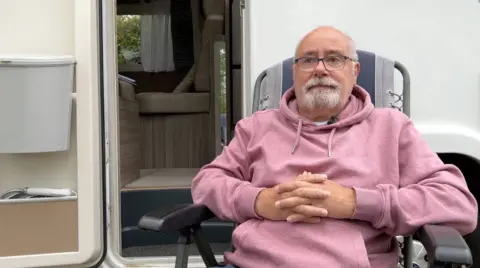Caravan park homeowners warn of seller's remorse
 BBC
BBCWhen the Reverend Vic Ready bought his first static caravan, he was looking for a holiday home on the Norfolk coast that his whole family could enjoy.
But Mr Ready, of Sheringham, Norfolk, said his experience of caravan ownership soured as a result of what he claimed was an "unregulated" industry that has left many people "suffering".
The caravan park involved rejected any "allegation of wrongdoing" and said it had had a "proud record of extremely satisfied customers".
Mr Ready is one of hundreds of caravan owners who have contacted the BBC in the wake of its investigation into the holiday park industry.
Mr Ready bought his first caravan in 2013 at Beeston Regis Holiday Park for £26,000 before trading it in, and paying an extra £25,000, for a "nicer caravan in a better position" seven years later.
Mr Ready said he then saw his original caravan on sale for £29,000 - a figure that surprised him.
Three years later, faced with what he claims were ever-rising ground rents of up to £6,000 per year, the family decided to sell up.
He said he was initially offered £8,250 by the park for his caravan.
A week later the park agreed to up its offer to £15,000, a sum Mr Ready accepted.
But a couple of days later, Mr Ready said he was sent an advert showing the caravan listed for sale by the park at £47,950.
"Until you eventually want to sell and leave the site, you don't appreciate how much it's going to cost you and how much you've actually lost," Mr Ready said.
"This is a corrupt, unregulated business and it needs to stop," he said. "So many people are suffering."
A spokesperson for Beeston Regis Holiday Park said Mr Ready had been a "valued customer" and claimed he was "happy with the deal" when he sold up.
The company said the caravan - a Pemberton Abingdon model - eventually sold for £35,000, which included a new 10-year site licence.
"Our business, like any other, is subject to constant cost increases, and our pitch fees have to rise to cover these costs," the spokesperson said, adding it strove to "minimise" such rises.
"In all businesses which rely on buying and selling, there has to be a profit margin, and – when we buy a caravan, we have to estimate the likely selling price and commit to a purchase price ahead of that," the company said.
It added Mr Ready had acquired his second caravan £8,000 below the asking price and said despite having "no obligation to buy the caravan from him" it had done so in "good faith" and had offered "than double the book value".
In 2021, Ipswich-based Paul Burke bought a caravan at the Suffolk Sands site in Felixstowe for £75,000.
The caravan was his wife's "happy place", Mr Burke said. But when site fees reached about £7,000 a year, the couple decided to sell up.
At first, he tried to sell privately and spoke to an estate agent.
"He told me he'd been in the business for 20 years," Mr Burke said. "In that time he'd not sold a single caravan."
"Part of the process is the purchasers need to be interviewed by the caravan park," said Mr Burke. "During that process they are persuaded to buy an alternative caravan directly from the park, probably with incentives such as a free year's site fees, or a better location or a slight upgrade."

Mr Burke said he felt he had no choice but to sell the caravan directly back to the park for £25,000.
"That is a lot of depreciation in three years," he said. "There is pretty much zero protection. This really does need some industry-wide protection."
Park Holidays, which owns Suffolk Sands, said it provided buyers with a licence agreement intended to help people make "informed purchasing" decisions.
It said the £75,000 purchase price included two years of pitch fees and said those fees were reviewed yearly and "broadly" mirrored the consumer price index.
The company said owners can sell privately as long as the prospective buyer passed its "vetting" procedures. It also said while it would seek to "assist" private sales, the park could offer "buying incentives such as favourable finance and free pitch fees" which private sellers could not.
A government spokesperson said it was "aware of the difficulties some holiday home owners have experienced and we have strengthened consumer law".
